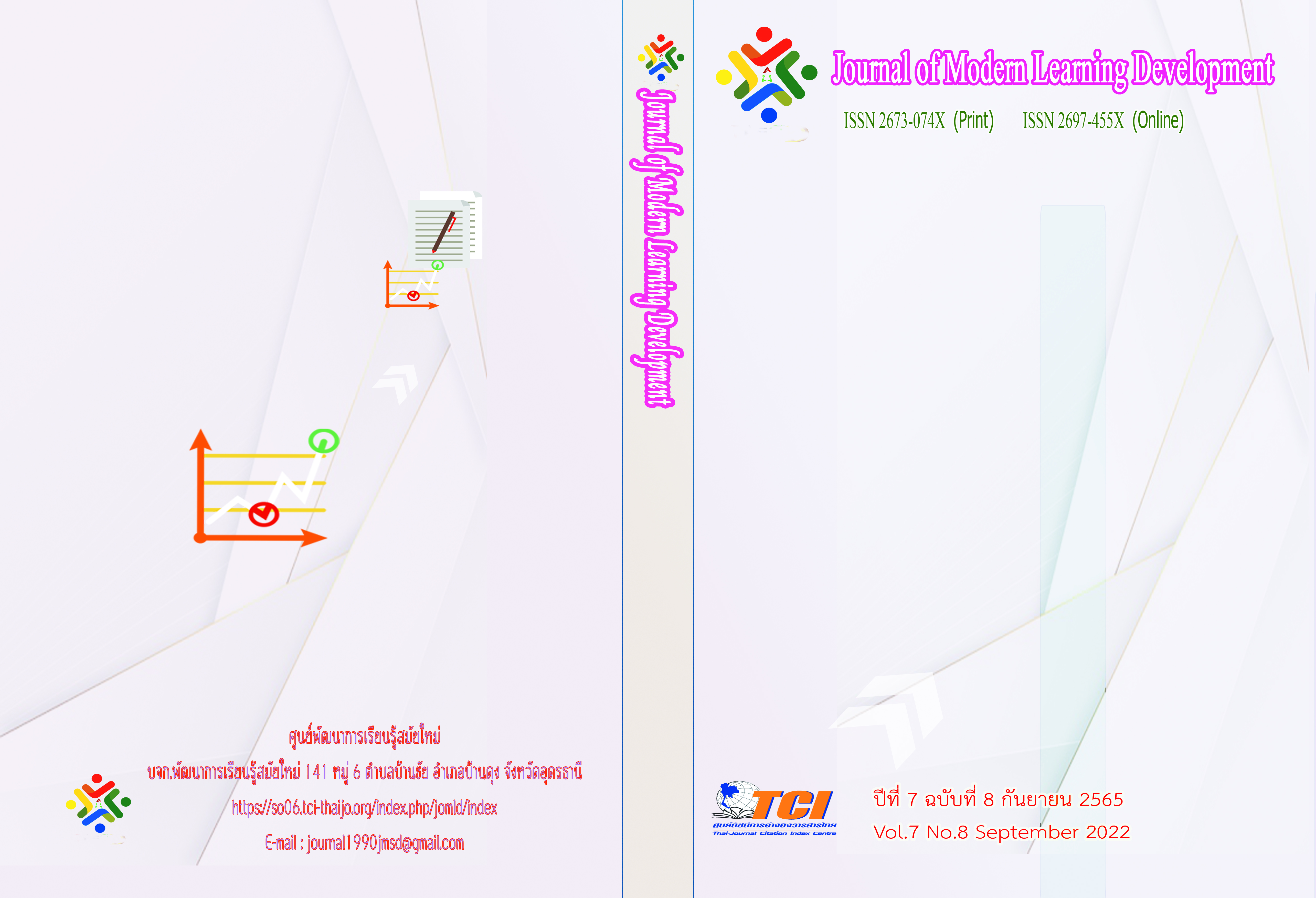Development of Word Problem Solving Ability of Prathomseuksa 5 Students using CIPPA MODE with Metacognition Stratesya
Main Article Content
Abstract
This research aimed 1) to develop academic achievement of Prathomseuksa 5 Students using CIPPA MODEL with Metacognition, and 2) Developing the ability to solve math problems of Prathomnseuksa 5 Students using CIPPA MODEL with Metacognition Strategy to overcome 70 percent criteria of full score. This research was classroom action research. The participants of this study were Prathomseuksa 5 Students, semester 1, academic year 2020, Ban Dong Keng School (Nam Wattana Upatham), Udon Thani Primary Educational Service Area Office 1, Udon Thani, 1 classroom, obtained by means of purposive sampling. There were 3 action research cycles. Research instruments were composed of 1) Lesson plans CIPPA MODEL with Metacognition Strategy, 2) Academic Achievement Measurement Item, 3) Mathematical Problem Solving Ability Test Form.
The results of the study were as follows:
- Aacademic achievement of Prathomseuksa 5 Students using CIPPA MODEL with Metacognition Strategy The mean score was 15.36, representing 76.82%, which was higher than the 70% threshold.
- The ability to solve math problems of Prathomseuksa 5 Students using CIPPA MODEL with Metacognition Strategy to overcome 70 percent criteria from a full score of 20. Findings of action research cycle 1 revealed that the mean was 14.09, representing 70.45%. Cycle 2 revealed that the mean was 14.18, representing 70.90%. Cycle 3 revealed that the mean was 15.36, representing 76.81%.
Article Details
References
กระทรวงศึกษาธิการ. (2551). พระราชบัญญัติการศึกษาแห่งชาติ พุทธศักราช 2542. กรุงเทพมหานคร: บริษัทสยามสปอรต์ ซินดิเคท จำกัด.
กัญญา กึ่งกลาง. (2564). การวิจัยพัฒนาความสามารถในการแก้โจทย์ปัญหาของนักเรียนชั้นมัธยมศึกษาปีที่ 5 เรื่อง แก๊สและสมบัติของแก๊ส ด้วยการจัดการเรียนรู้แบบสืบเสาะ 5 ขั้น ร่วมกับกลวิธีเมตาคอกนิชัน. วิทยานิพนธ์ปริญญาการศึกษามหาบัณฑิต สาขาวิชาการสอนวิทยาศาสตร์และคณิตศาสตร์
คณะศึกษาศาสตร์. บัณฑิตวิทยาลัย: มหาวิทยาลัยมหาสารคาม.
จรุง ขำพงศ์. (2542). ผลของการใช้กลวิธีเมตาคอคนิชัน ที่มีต่อความสามารถในการแก้โจทย์ปัญหาคณิตศาสตร์ของนักเรียนชั้นมัธยมศึกษาปีที่ 2. วิทยานิพนธ์ปริญญาครุศาสตรมหาบัณฑิต สาขาวิชาการศึกษาคณิตศาสตร์. บัณฑิตวิทยาลัย: จุฬาลงกรณ์มหาวิทยาลัย.
ทิศนา แขมมณี. (2545). เอกสารประกอบการอบรม การจัดการเรียนการสอนโดยยึดผู้เรียนเป็นศูนย์กลางซิปปาโมเดล (CIPPA model). กรุงเทพมหานคร: คณะครุศาสตร์ จุฬาลงกรณ์มหาวิทยาลัย.
ทิศนา แขมมณี. (2556). ศาสตร์การสอน. (พิมพ์ครั้งที่ 18). กรุงเทพมหานคร: สำนักพิมพ์แห่งจุฬาลงกรณ์ มหาวิทยาลัย.
พิมพันธ์ เดชะคุปต์. (2544). วิทยาการด้านการคิด. กรุงเทพมหานคร: เดอะมาสเตอร์กรุ๊ป แมเนจ เม้นท์จำกัด.
วราภรณ์ เกลี้ยงกล่น. (2557). การศึกษาความสามารถในการแก้ปัญหา วิชาเคมี เรื่อง พันธะเคมี ของนักเรียนชั้นมัธยมศึกษาปีที่ 4 โดยใช้ยุทธศาสตร์เมตาคอกนิชัน. วิทยานิพนธ์ปริญญาศึกษาศาสตรมหาบัณฑิต สาขาวิชาวิทยาศาสตรศึกษา คณะครุศาสตร์. บัณฑิตวิทยาลัย:มหาวิทยาลับขอนแก่น.
ศิรินภา นามโน (2560). การพัฒนาความสามารถในการแก้โจทย์ปัญหาฟิสิกส์และเจตคติต่อวิชาฟิสิกส์ของนักเรียนชั้นมัธยมศึกษาปีที่ 5 โดยใช้การเรียนรู้ แบบปัญหาเป็นฐานร่วมกับแนวคิดเมตาคอกนิชัน. วิทยานิพนธ์ปริญญาการศึกษามหาบัณฑิต สาขาวิชาหลักสูตรและการสอน คณะศึกษาศาสตร์. บัณฑิตวิทยาลัย: มหาวิทยาลัยมหาสารคาม.
สถาบันทดสอบทางการศึกษาแห่งชาติ (องค์กรมหาชน). (2561). ผลการทดสอบระดับชาติ O-Net. ออนไลน์. สืบค้นเมื่อ วันที่ 16 ตุลาคม 2564. แหล่งที่มา: http://www.onetresult.niets.or.th
สมนึก ภัททิยธนี. (2558). การวัดผลการศึกษา. (พิมพ์ครั้งที่ 10). กาฬสินธุ์: ประสานการพิมพ์.
สุนิสา สุวรรณฉาย และเกื้อจิตต์ ฉิมทิม. (2560). การพัฒนากิจกรรมการเรียนรู้คณิตศาสตร์โดยใช้รูปแบบ ซิปปา (CIPPA Model) ที่เน้นเทคนิค K-W-D-L เรื่อง โจทย์ปัญหาการบวกลบระคน ชั้นประถมศึกษาปีที่ 1. วารสารศึกษาศาสตร์ ฉบับวิจัยบัณฑิตศึกษา มหาวิทยาลัยขอนแก่น. 11 (4), 226-233.
อุษา ชมภูพฤกษ์. (2561). การพัฒนาความสามารถในการแก้โจทย์ปัญหาฟิสิกส์ และผลสัมฤทธิ์ ทางการเรียน รายวิชาฟิสิกส์ เรื่อง ไฟฟ้ากระแส ของนักเรียนชั้นมัธยมศึกษาปีที่ 5 โดยใช้ กลวิธีเมตาคอกนิชัน. วิทยานิพนธ์ปริญญาการศึกษามหาบัณฑิต สาขาวิชาหลักสูตรและการสอน คณะศึกษาศาสตร์. บัณฑิตวิทยาลัย: มหาวิทยาลัยมหาสารคาม.
Barbara, W. and John, F. (2005). A Theoretical Framework and Approach for Fostering Metacognitive Development. Educational Psychologist. 40 (4), 211-233.
Beyer, B.K. (1997). Improving Student Thinking : A Comprehensive Approach. Boston : Allyn and Bacon.
Kemmis, S. and McTaggart, R. (1988). The Action Research Planner. (3rd ed). Geelong, Australia: Deakin University Press.
Klausmier, H.J. (1989). Educational psychology. (5th ed). New York : Harper & Row.
Riedesel, A.C. (1990). Teaching Elementary School Mathematics. New Jersey : Prentice Hall.
Zulkiply, N., Kabit, M.R. and Ghani, K.A. (2008). Metacognition: What roles does it play in students' academic performance. International Journal of Learning, 15, 97-105.


